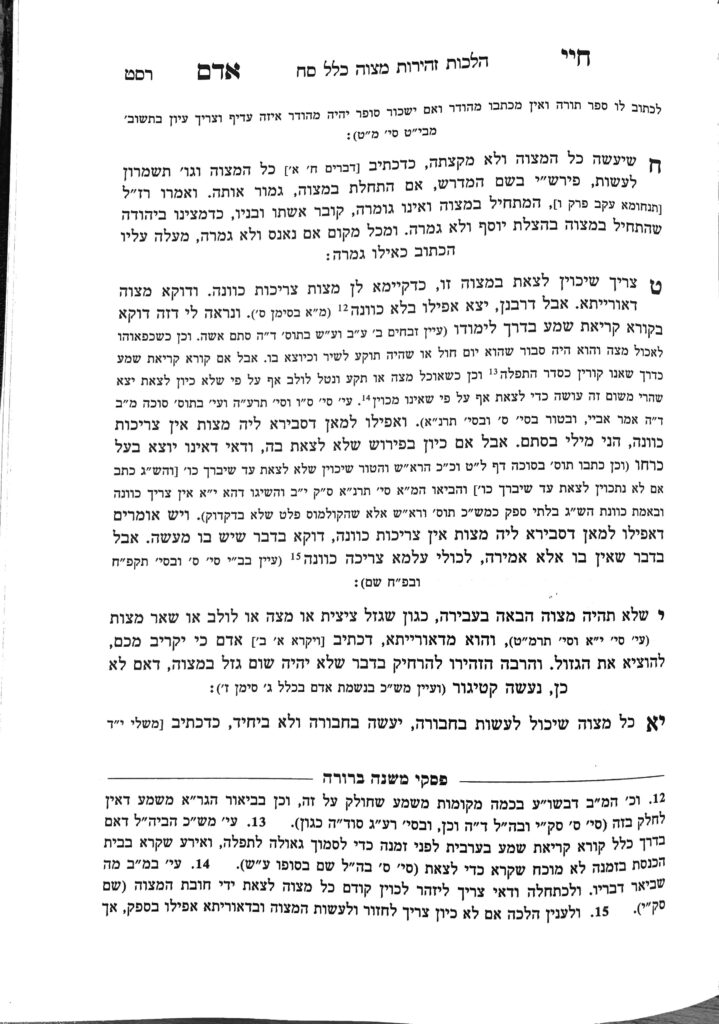We are continuing in siman 9, which discusses the concept of mitzvos tzrichos kavana. Yesterday, we learned that both the opinion of mitzvos tzrichos kavana and mitzvos ain tzrichos kavana would agree that if one has kavana hafachis, kavana not to be yotzei the mitzvah, they would not be yotzei. The Chayei Adam will give another case in which both opinions agree that a person needs kavana to be yotzei the mitzvah.
The Chayei Adam writes that the opinion which holds mitzvos ain tzrichos kavana only holds that one fulfills the mitzvah when the mitzvah in question is an action. However, if the mitzvah only involves speaking, everyone agrees that mitzvos tzrichos kavana. The source of this point is Rabbeinu Yona in the first perek of Brachos. The Gemara discusses the issue of kavana in regards to making brachos, and Rabbeinu Yona points out that the Gemara’s discussion applies even according to the opinion that mitzvos ain tzrichos kavana, because the entire mitzvah of making a bracha is only in the realm of speech.
Mitzvos tzrichos kavana refers to having kavana to fulfill the mitzvah, and not having kabbalistic intentions. Additionally, there are mitzvos to which multiple kavanos apply, and those additional kavanos are independent of the machlokes regarding mitzvos tzrichos kavana. We will give a few examples:
- The kavana of peirush hamilos, understanding the words of the first bracha of shemoneh esrei, is independent of the machlokes about mitzvos tzrichos kavana. The kavana of peirush hamilos is necessary according to everyone, because it is not kavana regarding the performance of the mitzvah of tefillah, but simply understanding what one is saying.
- The mitzvah of shemoneh esrei, to which the machlokes of mitzvos tzrichos kavana would apply, is a mitzvah deoraysa according to the Rambam, and according to the Ramban, it is a mitzvah derabanan. Additionally, according to the Ramban, one should have kavana to fulfill the words of the chachomim, i.e., the mitzvah asei of lo sasur. Thus, before a person begins shemoneh esrei, they should have this kavana in mind, and, as they recite shemoneh esrei, make sure to understand the words.
- Similarly, the concept of kabbolas ol malchus shamayim in the first pasuk of shema is independent of mitzvos tzrichos kavana. When a person recites shema, they should have two thoughts, that they are fulfilling the mitzvah of krias shema and that they are accepting ol malchus shamayim.
- Another example of multiple kavanos in one mitzvah includes mitzvos for which the Torah gave a reason. For example, the Torah tells us a person should sit in the sukkah to be reminded of the ananei hakavod. The Torah tells us to look at the tzitzis to remember the other mitzvos. The Torah tells us that a person should wear tefillin so that Toras Hashem beficha, the words of Hashem are in your mouth. The Tur understands that part of the mitzvah of tefillin is the lessons learned from the four parshiyos of the tefillin. The hineni muchan which some recite before putting on tefillin discusses all of these lessons.
Summary
- According to all opinions, if one has explicit intent that they are not fulfilling a mitzvah, they are not yotzei.
- According to all opinions, one must have explicit kavana when the mitzvah in question is not an action, such as making a bracha.
- According to all opinions, one must have explicit kavana for additional kavanos in a mitzvah. For example:
- Peirush hamilos in shemoneh esrei;
- Kabbolas ol malchus shamayim in shema;
- Sitting in the sukkah to remember the ananei hakavod;
- Wearing tzitzis to remember the other mitzvos;
- Wearing tefillin to remember the lessons of the parshiyos.



